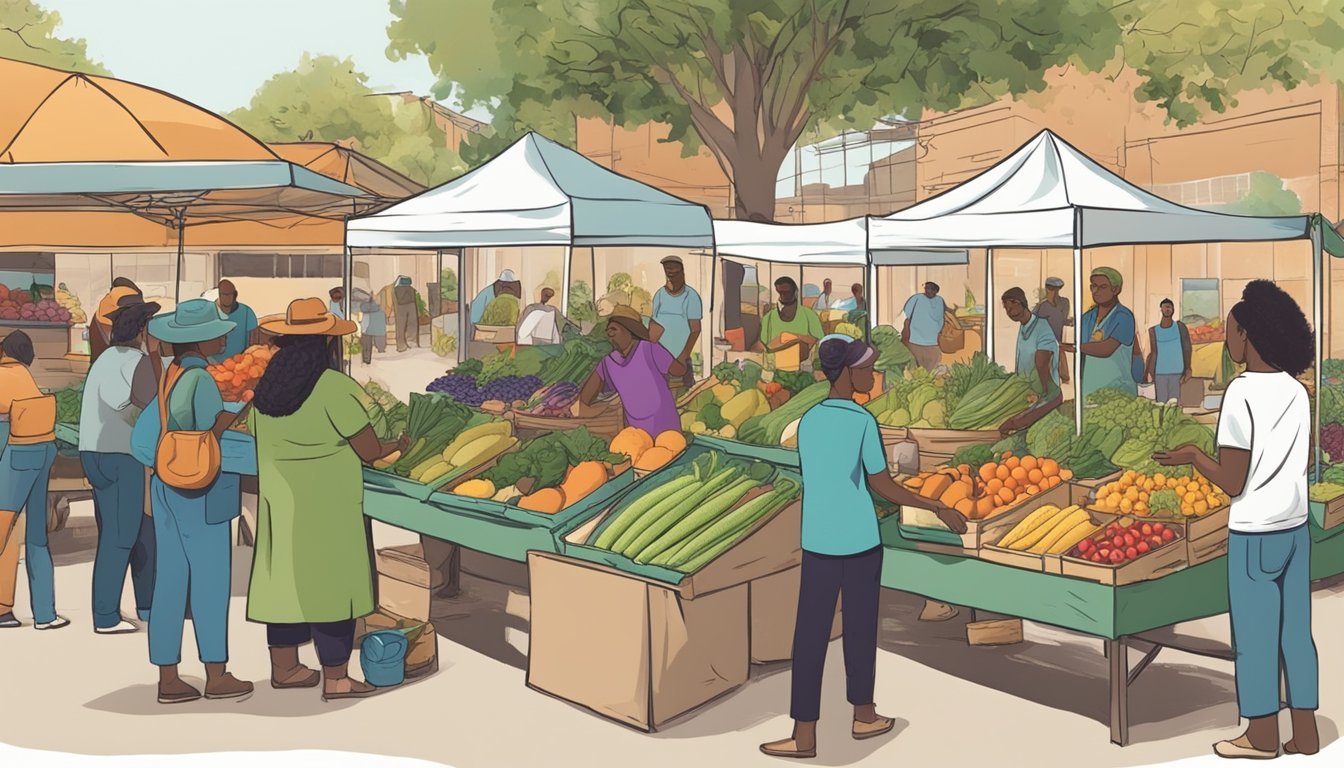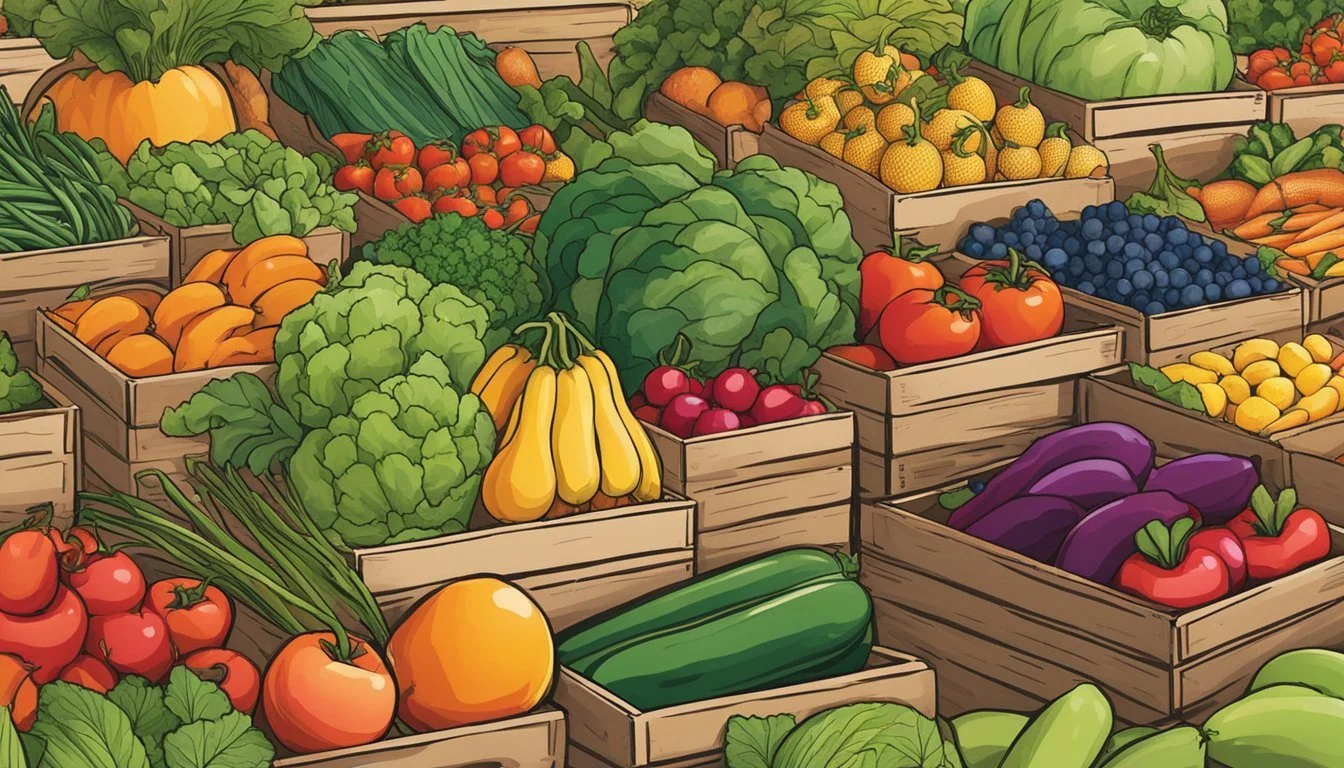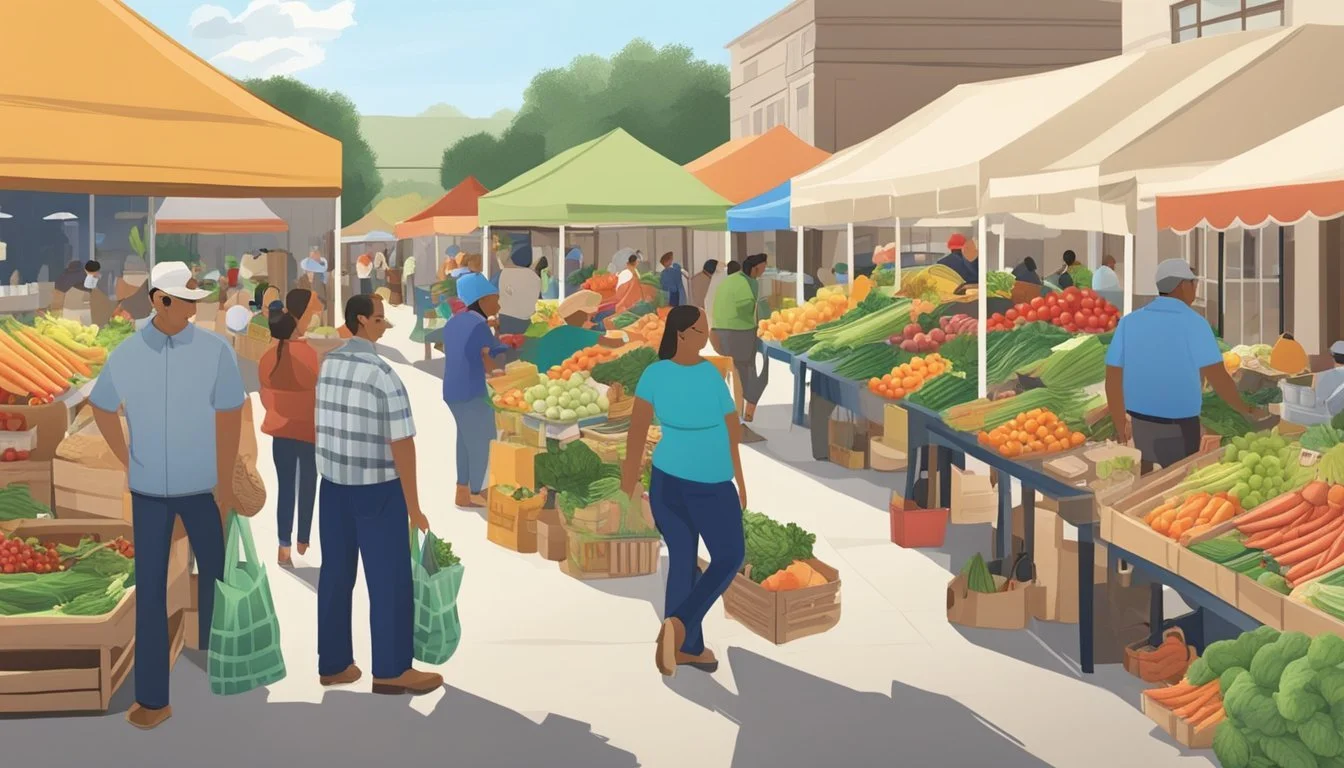Community Supported Agriculture (CSA) in Edinburg, TX
A Guide to Local Farm Partnerships
Community Supported Agriculture, commonly known as CSA, provides a direct link between local farmers and consumers, offering a sustainable alternative to the conventional food supply system. In Edinburg, Texas, this model has taken root, empowering both local farmers and community members with fresher food options and a stake in the cultivation and harvest of their produce. At the heart of CSA is the concept of mutual support and shared benefits. Consumers in Edinburg purchase shares in a farm's seasonal production, receiving regular distributions of locally grown farm products such as vegetables, fruits, herbs, and occasionally additional offerings like eggs or honey.
The rise of CSAs in the Edinburg region reflects a growing interest in food provenance and a commitment to supporting the local economy. Terra Preta Farm, for instance, stands as a testament to the success of this model, having served the Rio Grande Valley with organic produce since 2011. By engaging in CSA, residents bolster the agriculture within their own community, fostering a closer connection to the food they consume and the land it comes from. This partnership aids in reducing food miles, ensuring peak freshness of produce, and solidifying the bonds between the community members and the land.
The model of Community Supported Agriculture promotes a shared risk and reward system. With upfront investments in local farms, consumers effectively become shareholders and share in the bounty as well as the risks of farming, such as variable weather conditions and crop yields. This approach encourages responsible farming practices, greater food security within the community, and contributes to a more resilient local food economy. As such, CSA garners a substantial role in shaping the agricultural and ecological landscape of Edinburg, blending the agrarian with the communal for a sustainable future.
Understanding CSA
In Edinburg, TX, Community Supported Agriculture (CSA) provides a model for purchasing agricultural produce that supports local farmers and fosters sustainability. This section elucidates the history, benefits, and role of CSA in establishing sustainable food systems.
History and Principles
Community Supported Agriculture (CSA) began in Europe and Japan in the 1960s. It was brought to the United States by Jan Vander Tuin, with New Hampshire's Temple-Wilton Farm and Indian Line Farm in Massachusetts being among the first to adopt this model in 1986. The key principles of CSA involve:
Shared Risk and Reward: Both consumers and farmers share the risks and benefits of farming.
Advance Purchase of Shares: Consumers buy shares of the farm's harvest ahead of the growing season, providing farmers with upfront capital.
Regular Supply of Produce: Shareholders receive periodic distributions of farm produce, often on a weekly basis.
Benefits of CSA Programs
Joining a CSA program provides several advantages for both consumers and producers:
Fresh, Local Produce: Shareholders get access to farm-fresh products, sometimes including organic or biodynamic produce.
Economic Stability: Farmers benefit from a predictable income stream.
Community Engagement: CSA builds a strong relationship between farmers and the community.
Advantages for Consumers and Farmers:
Consumers Farmers Access to fresh, seasonal produce Predictable income through pre-sales Education on food sources and farming practices Improved cash flow and reduced waste Connection to the local food system Strengthened ties with the community
Role in Sustainable Food Systems
CSA plays a critical role in reinforcing sustainable food systems. It encourages eco-friendly practices by prioritizing seasonal and local produce, thus reducing carbon footprints associated with long-distance transportation. CSA also promotes biodiversity through varied crop selection and supports soil health. The direct relationship between the farmer and consumer heightens transparency and trust, contributing to more conscious consumer choices and fostering a resilient local food network.
Sustainable Aspects of CSA:
Local Consumption: Reduces transportation emissions and supports local economies.
Seasonal Selection: Encourages eating seasonal produce and diversifies farming operations.
Transparency: Offers consumers insight into food production and origin.
Through these approaches, CSA aligns with Edinburg's efforts to maintain ecologically responsible and economically viable agricultural practices.
How CSA Works
Community Supported Agriculture in Edinburg, TX, involves a partnership between local farmers and community members, where one commits to support the other through a structured model. It is characterized by its membership and subscription model, and it offers seasonal shares that represent a diverse array of produce.
Membership and Subscription Model
In a Community Supported Agriculture (CSA) system, individuals become members by purchasing a subscription from a local farm. This subscription is a commitment upfront, which provides the farmer with the necessary capital to plan for the growing season. For example, Terra Preta Farm, located near Edinburg, represents a family-operated farm where community members can subscribe to receive a variety of organic produce. A subscription often equates to buying a "share" of the anticipated harvest.
Subscription Benefits:
Provides farmers with a stable income
Ensures customers receive fresh, locally grown produce
Seasonal Shares and Diversity
Shares offered by the CSA consist of a wide range of produce and are distributed on a seasonal basis. This means that members receive fresh produce that is currently in season, which supports local farming cycles and promotes eco-conscious consumption. The content of these shares is diverse, often including vegetables, fruits, herbs, and sometimes flowers, reflecting what is being harvested at certain times of the year. For instance, the shares might vary from leafy greens in the spring to squashes in the fall, aligning with the regional growing patterns of Edinburg, TX.
Typical Seasonal Share Structure:
Spring: Leafy greens, herbs
Summer: Tomatoes, peppers, cucumbers
Fall: Root vegetables, squashes
Winter: If available, hardy greens or stored products from previous seasons
Members enjoy a selection that encapsulates the region’s agricultural diversity and fosters a connection to the rhythm of the natural growing season.
Local Impact of CSA
Community Supported Agriculture (CSA) has a significant and positive impact on the city of Edinburg, Texas. The model benefits not just the farmers but also the economy and the environment in concrete ways.
Support for Local Farmers
In Edinburg, local farmers like those at Terra Preta Farm gain a stable, upfront income source through CSA subscriptions. This allows them to plan their crop production more effectively and reduces the financial uncertainties associated with farming. CSA members receive a variety of organic vegetables, fruits, herbs, and flowers, directly supporting the livelihoods of these local cultivators and their families.
Strengthening Local Economies
CSA models contribute to the local economy in Edinburg by keeping money circulating within the community. When residents purchase CSA shares, they are essentially investing in local businesses. This practice helps to foster a thriving local food scene and creates jobs related to agriculture, distribution, and food preparation.
Environmental Benefits
CSAs in Edinburg help in reducing the carbon footprint associated with long-distance transportation of produce. Since the food is grown and consumed within the same geographic area, the environmental impact is minimized. Furthermore, local farmers typically employ more sustainable farming practices than larger, industrial farms, contributing to healthier soil and reduced pesticide usage.
Joining a CSA in Edinburg
In Edinburg, TX, residents have the opportunity to join Community Supported Agriculture (CSA) programs that provide fresh, seasonal produce while fostering relationships with local farmers.
Finding Local CSA Farms
Edinburg's Terra Preta Farm is a notable CSA option for those seeking organic fruits, vegetables, herbs, and flowers. Established in November 2011, this family-run farm exemplifies the community's commitment to sustainable and local agriculture. Individuals can find information on joining by inquiring directly with Terra Preta or checking for farm listings on platforms like LocalHarvest.
What to Expect in a CSA Share
A typical CSA share from farms around Edinburg could include a variety of seasonal produce such as fresh vegetables and fruit, reflecting the region's agricultural diversity. Shares may vary in size and frequency depending on the specific farm's offerings. Terra Preta Farm, for instance, may provide a weekly or bi-weekly box to its CSA members during the growing season.
Building Community Relationships
By participating in a CSA in Edinburg, members are not just receiving fresh produce but also contributing to the local economy and developing a relationship with the people who grow their food. This reciprocal connection supports a sustainable food system and cultivates a sense of communal well-being.
Maximizing Your CSA Experience
To make the most of a Community Supported Agriculture program in Edinburg, TX, one should embrace seasonal eating, proper produce storage, and active community involvement. These steps ensure both the longevity of the produce and the richness of the CSA experience.
Incorporating Seasonal Produce into Your Diet
Members of a CSA often receive a variety of vegetables and occasionally other farm products like eggs and cheese. Adapting one's diet to incorporate these seasonal items can be both rewarding and nutritious. Here are ways they can do this:
Explore New Recipes: Utilize CSA items in diverse recipes that highlight their freshness.
Meal Planning: Plan weekly meals around the seasonal produce to minimize waste and enjoy peak flavors.
Storage and Preservation Tips
Proper storage extends the life of CSA produce. Here are a few tips for keeping items fresh:
Vegetables: Store leafy greens in airtight containers and root vegetables in a cool, dark place.
Eggs and Cheese: Keep eggs in their carton in the main body of the fridge and store cheese in breathable wrapping.
Engaging with the CSA Community
An integral part of a CSA is the sense of community. Engagement leads to a more fulfilling experience. Participants can:
Provide Feedback: Share thoughts with farmers to help improve the CSA.
Community Events: Attend CSA gatherings to connect with members and share cooking tips.
By following these strategies, CSA members in Edinburg can enhance both the longevity of their produce and their contribution to the community’s resilience.
FAQs and Additional Resources
This section provides answers to commonly asked questions about Community Supported Agriculture and points toward further reading and educational materials for those interested in CSA in Edinburg, TX.
Common Questions about CSA
What is a CSA?
CSA stands for Community Supported Agriculture, where individuals can purchase shares of a farm's harvest in advance, receiving a variety of seasonal produce throughout the farming season.
How do I join a CSA in Edinburg, TX?
Interested parties can join a CSA by contacting local farms, such as Terra Preta Farm, directly and subscribing to their offerings. A CSA membership typically involves paying an upfront fee to cover anticipated harvests.
Is CSA limited to vegetables?
No, while many CSAs primarily offer a diverse range of organic vegetables, fruits, and herbs, some may also include other farm products like eggs, honey, and even meat.
Can CSA help me try new vegetables?
Yes, CSA memberships often introduce consumers to a variety of new vegetables since the selections are based on seasonal availability and farm production.
Where can I find more information?
The U.S. Department of Agriculture (USDA) can be a resource for more information on CSA statistics and initiatives, as well as for finding other local CSA farms.
Further Reading and Support
U.S. Department of Agriculture: For comprehensive details and data on CSAs across the country.
Local Farmers Markets: Often a place where CSA farms share information and offer memberships. Attending these markets can provide insights into local CSA offerings and agricultural practices.
CSA Guide: A guide can provide extensive knowledge on the workings of CSA, benefits for both farmers and consumers, and how to select the right CSA.
Community Agriculture Outreach: Support groups and networks that help connect consumers with farmers, providing education on sustainable practices and the importance of CSA.
Readers seeking comprehensive insights into the CSA model, agriculture practices, or looking to support local farms are encouraged to explore the resources provided by the USDA, engage with local farmers markets, and seek out additional community-based agriculture guides and groups.
Conclusion
In Edinburg, TX, Community Supported Agriculture (CSA) models have become a valuable part of the local food ecosystem. They offer a system where consumers can subscribe to the harvest of a local farm, fostering a connection between the community and food producers. This approach champions the benefits of seasonal food by ensuring that members gain access to fresh and seasonal produce grown within their community.
Consumers are increasingly recognizing the importance of eating local. They understand that locally-grown, high-quality, nutritious produce not only supports their health but also the local economy and the environment. CSA initiatives in Edinburg allow individuals and families to become part of a food community dedicated to sustainability and resilience.
The reach of CSA programs extends beyond simple consumer-producer transactions. They are an embodiment of community spirit and a shared commitment to nutritious produce and sustainable agricultural practices. Through participation in CSA, residents of Edinburg contribute to a model that values food transparency, freshness, and community collaboration.
In embracing CSA, Edinburg's residents demonstrate a collective investment in the future of agriculture and the health of their local community. With each season, the commitment to CSA reinforces the importance of the land, the people who work it, and the community that supports it.







